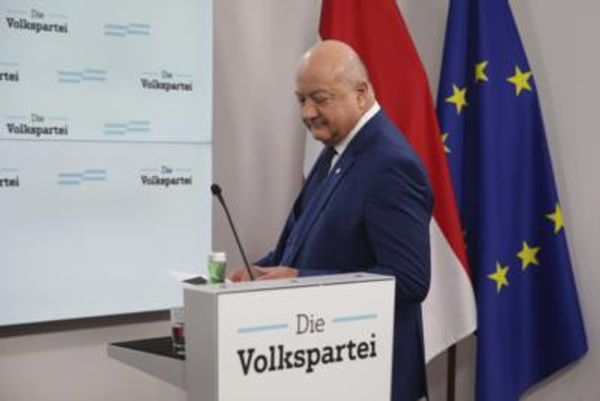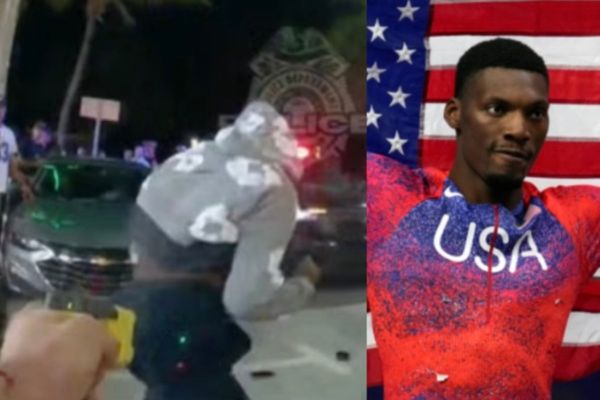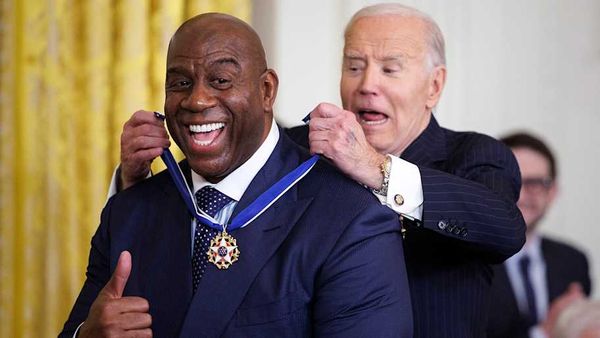It is not often that I swear at my boss.
But that is what popped out in jubilant disbelief at 4.50am when my deputy editor told me Cleo Smith had been found alive in Carnarvon, 18 days after she had disappeared on a family camping trip.
"The cops broke down a door and found her in a house," he said.
"We're throwing everything at this. We want you on the 7.00am flight from Perth."
I thought of the young parents I had met two weeks prior, Ellie Smith and Jake Gliddon — the pain in their faces seared in my mind.
I could not believe they now had their daughter back.
As I grabbed my bag and ran out the door, my colleagues who had been holding the fort in Carnarvon, journalist Evelyn Manfield and camera operator Rob Koenig-Luck had just woken too.
Evelyn pounding on Rob's motel room door: "They found her! She's alive!"
By 5.00am they were live on television, breaking the unbelievable development to the nation.
"In 32-and-a-half years with the ABC I've never got to tell a story that made so many people smile and cry at the same time," Rob said.
It was news we had all hoped for, but very few expected.
A girl and her sleeping bag vanish
Almost three weeks prior, the police had issued an alert on a Saturday morning about a missing child last seen at a remote beachside campsite north of Carnarvon.
My colleagues from the ABC Geraldton office, Michelle Stanley and Chris Lewis, jumped to action and were first on the scene.
They covered the search as the weekend went by and neither the police, the SES, nor the army could find any sign of Cleo Smith.
On Monday, myself and camera operator Hugh Sando were on the first flight from Perth to Carnarvon.
This story was close to home for Hugh.
The same age as Ellie Smith, he had grown up in Carnarvon and they were school friends.
Things had changed by the time we arrived at the Blowholes and it was no longer a simple missing child case.
We crossed live into the 7.00pm news about homicide detectives arriving and police fears the girl had been abducted.
People were already captivated — a four-year-old girl cannot just disappear into thin air.
The following morning, cyclonic-looking weather tore through Carnarvon and the land search was temporarily suspended.
Meanwhile, a different storm was brewing online.
Cleo's parents had not spoken publicly since her disappearance and armchair detectives on social media were openly speculating they were somehow involved.
This came despite police insisting they were not suspects.
Every major news outlet in the country had requested an interview with the parents.
Ordinarily private people, they declined, preferring police to speak on their behalf.
By day four the balance had tipped, and detectives decided the appeal for public information on Cleo Smith needed all the attention it could get.
An important interview
My phone rang. It was the police — they asked if I would interview Ellie and Jake.
Just one interview. With one reporter. And one camera operator. On the condition that it be made available to all news outlets to use freely.
It is known as a pool interview and is common when police want to avoid putting people through the stress of multiple interviews or a crowded press conference.
WA Police know me, and they know the ABC — our network is regularly trusted in these scenarios.
They were confident Hugh and I would get it right, and so were we.
It was an interview everyone had been waiting for.
People knew little about the parents, Cleo Smith, the camping trip or how things unfolded.
There were so many questions and this was an opportunity to answer them.
And more importantly, it was an opportunity for the plea from police and Cleo's parents to be spread far and wide.
I knew the interview would lead the news around the country and hit headlines globally.
Hugh knew it would be tough emotionally, given his connection to Ellie, but there was no-one he would rather do it.
At this stage many people behind closed doors believed Cleo Smith was already dead.
Police escorted us past the roadblock and into the campsite where their mobile command centre was set up.
The first thing Ellie did was give Hugh a big hug, the friendly face from her childhood a welcome sight.
No easy questions
Our options for the interview were inside a cramped police truck, or outside where it was still blowing an absolute gale from the lingering storm.
We opted for the truck.
Being interviewed on camera can be bizarre and daunting at the best of times.
I did what I could to make them comfortable as we set up and waited for the police to be ready also.
Whiteboards in the background had to be cleared of information about the investigation, fans and noisy generators shut off.
In that setting most small talk would have felt ridiculous and irrelevant, but I made sure I chatted with them beforehand. It was important that I developed what rapport I could and that they felt they could trust me.
I talked Ellie and Jake through how the interview would work, and I didn't hesitate to repeat myself a few times – no-one pays attention when they have that much going on in their mind – I introduced myself at least three times.
We had no guarantee of how much time we would have for the interview, no way of knowing if Ellie or Jake might break down, or if police might jump in and end it.
Every question had to count.
But I did not have anything written down. I knew there were specific points I had to cover. But this had to be a conversation, I had to maintain that connection, and really listen.
A tried and tested interview tip to get conversation flowing is to begin with an easy question, but there is no easy question for someone in their situation.
I started by asking Ellie to run me through the events of the Friday night and the following morning.
At least she could lean on straight facts, and she had no doubt already recounted the events to police countless times.
I kept my questions open, leaving space for Ellie and Jake to speak freely.
On occasion I jumped in with a quick clarification question — such as checking the "open zipper" was to the outside of the tent rather than the divider — before letting them continue.
There was no escaping the emotion, but I resisted the urge to jump in and fill any awkward silences or emotional pauses, staying silent and letting Ellie pick up and continue sharing.
Ellie Smith has brilliant, piercing blue eyes, and behind them there was so much pain.
Jake Gliddon was on the verge of tears throughout, loss clear in his face.
Even as Ellie recounted the morning Cleo could not be found there was disbelief in her voice.
Unimaginable pain for all to see
As Ellie described Cleo, her voice quivering, she managed to smile and laugh through tears – the love for her daughter clear to see.
A year or two younger than me, I was taken by Ellie's strength.
Telling me, with the knowing confidence of a mother, that Cleo would not have wandered off.
She spoke of hoping that every phone call would bring news Cleo had been found.
The interview came to a finish and I wanted to tell them it was all going to be OK, but I didn't, because I didn't know it would be.
A plea echoing around the world
By now it was almost 2.00pm, which means 5.00pm on the east coast where the TV networks' major bulletins were fast approaching.
Ellie and Jake's message was broadcast far and wide.
Amid our own scramble to file for the ABC's audience, I stole a moment to show Hugh my phone — it was his footage being broadcast on CNN.
He showed me his arm, despite the heat, there were goosebumps.
The following day there were calls coming in from all over.
Waiting to go live on BBC Radio, it felt bizarre to be sitting at that remote roadblock, in what felt like the most isolated pocket of the world, in the now sweltering sun, while listening to the UK's local weather forecast of four degrees and chances of snow.
By Thursday a $1 million reward was announced, and a nationwide alert issued for people to keep an eye out for the four-year-old.
Despite all the attention, one week on from the disappearance police had no solid leads.
The ABC were pulling me and Hugh out. We were knackered, but felt no relief flying back to Perth.
Cleo remained missing, and we knew there was more to this important story we could help tell.
Another week and a town drowning in uncertainty
We were back in Carnarvon by Tuesday.
There were fewer developments that second week, but we kept ourselves busy working to paint a picture for the audience of this unique part of the world where this tragic mystery was unfolding.
We documented what felt like every inch of that campsite, and the remote roads nearby.
The rest of our time was filled with endless stakeouts, monitoring police and forensics.
Police were throwing everything at the investigation, but still nothing.
Nearing the two-week mark, Hugh and I were pulled out once more for what we thought might be the last time.
Week three: 'It's too quiet'
I handed over the reins in Carnarvon to Evelyn Manfield who diligently continued to chip away, telling the story despite what felt like no progress in the investigation.
Evelyn and Rob were having dinner with another TV crew on what was by all accounts a quiet Tuesday night in Carnarvon.
But 32 years of experience must have been ringing loudly in Rob's ears.
He turned to the table and said: "It's too quiet. You know, it's on nights like this that something big happens."
Sure enough, a few hours later Evelyn was banging on his motel room door.
Rob said they lost count after 21 live crosses that day, each of them featuring Evelyn's genuine emotion.
"I knew this story back to front, but I also knew the emotion everyone in Carnarvon was feeling – they all desperately wanted Cleo back home," Evelyn said.
The scramble to tell an unbelievable story
Back in Perth, the newsroom had roared to life. It was barely 5.30am and the place was full.
Colleagues had heard the news and come straight to work to pitch in where they could.
As did reporters from regional newsrooms up and down WA who had been covering the story — Anthony Pancia, Mark Bennett, Cecile O'Connor, Bridget Herrmann, and Verity Gorman were among those who spent days on the ground in Carnarvon.
No stranger to the 10-hour drive from Perth, Hugh jumped in a car with digital reporter Rebecca Trigger and they hit the road, while I threw together a story for the 7.00pm news before boarding a two-hour flight.
Seemingly every other journalist in Perth was racing to Carnarvon and the ABC only managed to secure a single ticket on a commercial flight that day.
On arrival in Carnavon, Hugh and I were off to find the party, crossing into the 7.00pm news from a local hotel where people were celebrating.
But first we went to the crime scene – I could not believe how close it was to where we had spent the past two weeks.
It was a hive of activity, dozens of police and twice as many members of the media.
Some networks had flown their anchors up to host TV bulletins from the street.
Even before Cleo Smith had been found there were so many people in town there was barely a hire car available; now there was nothing.
One network enlisted the handful of cab drivers in Carnarvon to drive them around all day with the meter running, racking up thousands of dollars.
Days like weeks
So much happened in the space of 48 hours that reporters were catching themselves saying things like, 'a few days ago on Wednesday, I mean yesterday'.
The Premier arrived in town, we saw Cleo Smith for first time, we met the detectives involved in her rescue.
By Thursday night a man had been charged.
Things changed again, Cleo Smith was an alleged victim of child stealing and another charge, and later that day the family released a statement including a request for privacy.
Suddenly Carnarvon was quiet.
The news focus became the forensic operation at the home of the accused, which wrapped up about a week later.
There was a greater sense of relief leaving Carnarvon for the third time.
There is a long road ahead for the family and with the police investigation.
But for Ellie, Jake, Cleo and her sister, their family is "whole again".
Editor's note: A man accused of kidnapping Cleo Smith is yet to enter a plea to the charges.







